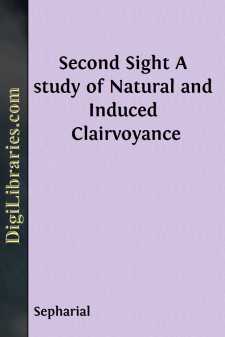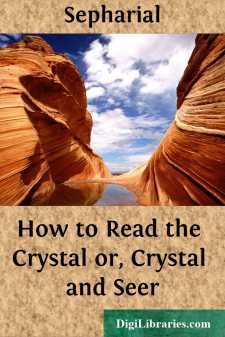Categories
- Antiques & Collectibles 13
- Architecture 36
- Art 48
- Bibles 22
- Biography & Autobiography 813
- Body, Mind & Spirit 142
- Business & Economics 28
- Children's Books 14
- Children's Fiction 11
- Computers 4
- Cooking 94
- Crafts & Hobbies 4
- Drama 346
- Education 46
- Family & Relationships 57
- Fiction 11829
- Games 19
- Gardening 17
- Health & Fitness 34
- History 1377
- House & Home 1
- Humor 147
- Juvenile Fiction 1873
- Juvenile Nonfiction 202
- Language Arts & Disciplines 88
- Law 16
- Literary Collections 686
- Literary Criticism 179
- Mathematics 13
- Medical 41
- Music 40
- Nature 179
- Non-Classifiable 1768
- Performing Arts 7
- Periodicals 1453
- Philosophy 64
- Photography 2
- Poetry 896
- Political Science 203
- Psychology 42
- Reference 154
- Religion 513
- Science 126
- Self-Help 84
- Social Science 81
- Sports & Recreation 34
- Study Aids 3
- Technology & Engineering 59
- Transportation 23
- Travel 463
- True Crime 29
Second Sight A study of Natural and Induced Clairvoyance
by: Sepharial
Categories:
Description:
Excerpt
INTRODUCTION
Few words will be necessary by way of preface to this book, which is designed as an introduction to a little understood and much misrepresented subject.
I have not here written anything which is intended to displace the observations of other authors on this subject, nor will it be found that anything has been said subversive of the conclusions arrived at by experimentalists who have essayed the study of clairvoyant phenomena in a manner that is altogether commendable, and who have sought to place the subject on a demonstrable and scientific basis. I refer to the proceedings of the Society for Psychical Research.
In the following pages I have endeavoured to indicate the nature of the faculty of Second Sight or Clairvoyance, the means of its development, the use of suitable media or agents for this purpose, and the kind of results that may be expected to follow a regulated effort in this direction. I have also sought to show that the development of the psychic faculties may form an orderly step in the process of human unfoldment and perfectibility.
As far as the nature and scope of this little work will allow, I have sought to treat the subject on a broad and general basis rather than pursue more particular and possibly more attractive scientific lines. What I have here said is the result of a personal experience of some years in this and other forms of psychic development and experimentation. My conclusions are given for what they are worth, and I have no wish to persuade my readers to my view of the nature and source of these abnormal phenomena. The reader is at liberty to form his own theory in regard to them, but such theory should be inclusive of all the known facts. The theories depending on hypnotic suggestion may be dismissed as inadequate. There appear to remain only the inspirational theory of direct revelation and the theory of the world-soul enunciated by the Occultists. I have elected in favour of the latter for reasons which, I think, will be conspicuous to those who read these pages.
I should be the last to allow the study of psychism to usurp the legitimate place in life of intellectual and spiritual pursuits, and I look with abhorrence upon the flippant use made of the psychic faculties by a certain class of pseudo-occultists who serve up this kind of thing with their five o'clock tea. But I regard an ordered psychism as a most valuable accessory to intellectual and spiritual development and as filling a natural place in the process of unfoldment between that intellectualism that is grounded in the senses and that higher intelligence which receives its light from within. From this view-point the following pages are written, and will, I trust, prove helpful.
CHAPTER I.
THE SCIENTIFIC POSITION
It would perhaps be premature to make any definite pronouncement as to the scientific position in regard to the psychic phenomenon known as "scrying," and certainly presumptuous on my part to cite an authority from among the many who have examined this subject, since all are not agreed upon the nature and source of the observed phenomena. Their names are, moreover, already identified with modern scientific research and theory, so that to associate them with experimental psychology would be to lend colour to the idea that modern science has recognized this branch of knowledge. Nothing, perhaps, is further from the fact, and while it cannot in any way be regarded as derogatory to the highest scientist to be associated with others, of less scientific attainment but of equal integrity, in this comparatively new field of enquiry, it may lead to popular error to institute a connection. It is still fresh in the mind how the Darwinian hypothesis was utterly misconceived by the popular mind, the suggestion that man was descended from the apes being generally quoted as a correct expression of Darwin's theory, whereas he never suggested any such thing, but that man and the apes had a common ancestor, which makes of the ape rather a degenerate lemur than a human ancestor. Other and more prevalent errors will occur to the reader, these being due to the use of what is called "the evidence of the senses"; and of all criteria the evidence of sensation is perhaps the most faulty. Logical inference from deductive or inductive reasoning has often enough been a good monitor to sense-perception, and has, moreover, pioneered the man of science to correct knowledge on more than one occasion. But as far as we know or can learn from the history of human knowledge, our senses have been the chiefest source of error. It is with considerable caution that the scientist employs the evidence from sense alone, and in the study of experimental psychology it is the sense which has first to be corrected, and which, in fact, forms the great factor in the equation. A person informs me that he can see a vision in the crystal ball before him, and although I am in the same relation with the "field" as he, I cannot see anything except accountable reflections. This fact does not give any room for contradicting him or any right to infer that it is all imagination. It is futile to say the vision does not exist. If he sees it, it does exist so far as he is concerned. There is no more a universal community of sensation than of thought. When I am at work my own thought is more real than any impression received through the sense organs. It is louder than the babel of voices or the strains of instrumental music, and more conspicuous than any object upon which the eye may fall. These external impressions are admitted or shut out at will. I then know that my thought is as real as my senses, that the images of thought are as perceptible as those exterior to it and in every way as objective and real....



